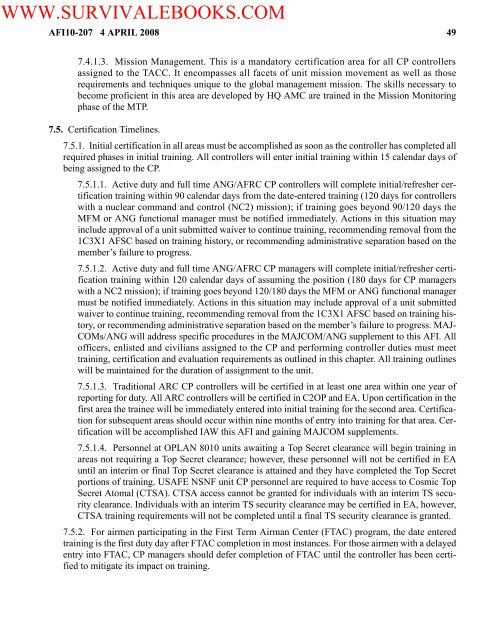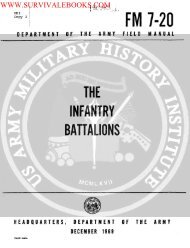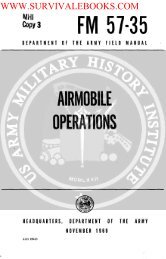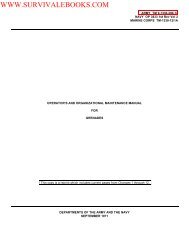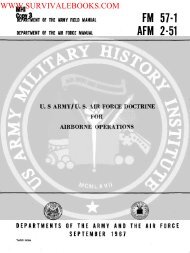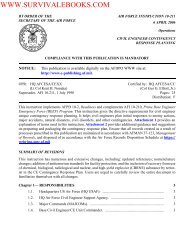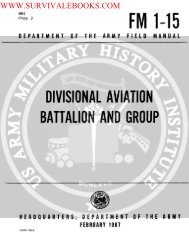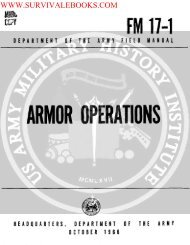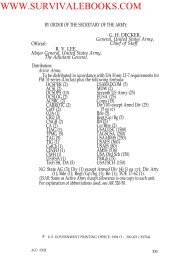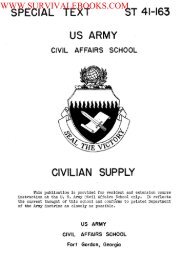2004 US Air Force OPERATIONAL REPORTING ... - Survival Books
2004 US Air Force OPERATIONAL REPORTING ... - Survival Books
2004 US Air Force OPERATIONAL REPORTING ... - Survival Books
You also want an ePaper? Increase the reach of your titles
YUMPU automatically turns print PDFs into web optimized ePapers that Google loves.
WWW.SURVIVALEBOOKS.COMAFI10-207 4 APRIL 2008 497.4.1.3. Mission Management. This is a mandatory certification area for all CP controllersassigned to the TACC. It encompasses all facets of unit mission movement as well as thoserequirements and techniques unique to the global management mission. The skills necessary tobecome proficient in this area are developed by HQ AMC are trained in the Mission Monitoringphase of the MTP.7.5. Certification Timelines.7.5.1. Initial certification in all areas must be accomplished as soon as the controller has completed allrequired phases in initial training. All controllers will enter initial training within 15 calendar days ofbeing assigned to the CP.7.5.1.1. Active duty and full time ANG/AFRC CP controllers will complete initial/refresher certificationtraining within 90 calendar days from the date-entered training (120 days for controllerswith a nuclear command and control (NC2) mission); if training goes beyond 90/120 days theMFM or ANG functional manager must be notified immediately. Actions in this situation mayinclude approval of a unit submitted waiver to continue training, recommending removal from the1C3X1 AFSC based on training history, or recommending administrative separation based on themember’s failure to progress.7.5.1.2. Active duty and full time ANG/AFRC CP managers will complete initial/refresher certificationtraining within 120 calendar days of assuming the position (180 days for CP managerswith a NC2 mission); if training goes beyond 120/180 days the MFM or ANG functional managermust be notified immediately. Actions in this situation may include approval of a unit submittedwaiver to continue training, recommending removal from the 1C3X1 AFSC based on training history,or recommending administrative separation based on the member’s failure to progress. MAJ-COMs/ANG will address specific procedures in the MAJCOM/ANG supplement to this AFI. Allofficers, enlisted and civilians assigned to the CP and performing controller duties must meettraining, certification and evaluation requirements as outlined in this chapter. All training outlineswill be maintained for the duration of assignment to the unit.7.5.1.3. Traditional ARC CP controllers will be certified in at least one area within one year ofreporting for duty. All ARC controllers will be certified in C2OP and EA. Upon certification in thefirst area the trainee will be immediately entered into initial training for the second area. Certificationfor subsequent areas should occur within nine months of entry into training for that area. Certificationwill be accomplished IAW this AFI and gaining MAJCOM supplements.7.5.1.4. Personnel at OPLAN 8010 units awaiting a Top Secret clearance will begin training inareas not requiring a Top Secret clearance; however, these personnel will not be certified in EAuntil an interim or final Top Secret clearance is attained and they have completed the Top Secretportions of training. <strong>US</strong>AFE NSNF unit CP personnel are required to have access to Cosmic TopSecret Atomal (CTSA). CTSA access cannot be granted for individuals with an interim TS securityclearance. Individuals with an interim TS security clearance may be certified in EA, however,CTSA training requirements will not be completed until a final TS security clearance is granted.7.5.2. For airmen participating in the First Term <strong>Air</strong>man Center (FTAC) program, the date enteredtraining is the first duty day after FTAC completion in most instances. For those airmen with a delayedentry into FTAC, CP managers should defer completion of FTAC until the controller has been certifiedto mitigate its impact on training.


